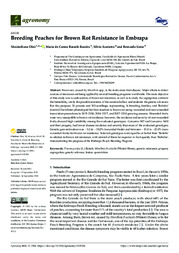Breeding Peaches for Brown Rot Resistance in Embrapa.
Breeding Peaches for Brown Rot Resistance in Embrapa.
Author(s): DINI, M.; RASEIRA, M. do C. B.; SCARIOTTO, S.; UENO, B.
Summary: Brown rot, caused by Monilinia spp., is the main stone fruit disease. Major efforts to detect sources of resistance are being applied by several breeding programs worldwide. The main objective of this study was to seek sources of brown rot resistance, as well as to study the segregation, estimate the heritability, verify the possible existence of the maternal effect, and estimate the genetic advances. For this purpose, 20 parents and 303 seedlings, representing 16 breeding families, and "Bolinha" (control) have been phenotyped for fruit reaction to brown rot using wounded and non-wounded inoculation procedures in 2015-2016, 2016-2017, and 2017-2018 growing seasons. Wounded fruits were very susceptible to brown rot incidence, however, the incidence and severity of non-wounded fruits showed high variability among the evaluated genotypes. Conserva 947 and Conserva 1600 and their progeny, had lower disease incidence and severity than most of the evaluated genotypes. Genetic gain estimation was ?5.2 to ?30.2% (wounded fruits) and between ?15.0 to ?25.0% (nonwounded fruits) for brown rot resistance. Selected genotypes were equal to or better than "Bolinha" in relation to brown rot resistance, with several of them far superior in fruit quality than "Bolinha", demonstrating the progress of the Embrapa Peach Breeding Program.
Publication year: 2022
Types of publication: Journal article
Keywords: Monilinia, Monilinia spp, Podridão Parda, Prunus, Prunus Persica
Observation
Some of Embrapa's publications are published as ePub files. To read them, use or download one of the following free software options to your computer or mobile device. Android: Google Play Books; IOS: iBooks; Windows and Linux: Calibre.
Access other publications
Access the Agricultural Research Database (BDPA) to consult Embrapa's full library collection and records.
Visit Embrapa Bookstore to purchase books and other publications sold by Embrapa.

